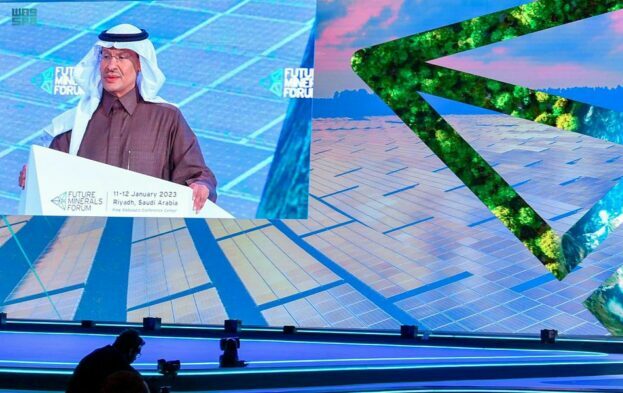Saudi Arabia’s energy minister, Prince Abdulaziz bin Salman, revealed that recent discoveries showed a diversified uranium portfolio in the kingdom, and that contracts for nuclear power reactors that his country plans to build will be awarded “very soon.”
Prince Abdulaziz bin Salman’s remarks came on the sidelines of the International Mining Conference held in Riyadh, the first day of which witnessed the signing ceremony of 25 cooperation agreements and memorandums of understanding between a number of government agencies, companies and institutions participating in the conference.
The minister added that the kingdom seeks to manufacture nuclear fuel for domestic use and export it. “This use includes the production of yellowcake, low-enriched uranium and the manufacture of nuclear fuel,” the Saudi minister said.
Read: Construction starts on Egypt’s first nuclear plant
He explained that the Kingdom intends to use its uranium resources, in line with international obligations and standards of the nuclear fuel production cycle.
The Saudi energy minister confirmed that the Saudi national nuclear program for atomic energy will work on building nuclear reactors in the Kingdom, which will include in the first phase two large commercial nuclear reactors before expanding further.
Prince Abdulaziz said earlier, “We have large quantities of uranium and we will exploit it commercially in an optimal way. “We will deal with uranium reserves transparently, and we will look for the right partners.”
Saudi Arabia has repeatedly said it is seeking to diversify away from oil to meet its future energy needs. King Abdullah City for Atomic and Renewable Energy (K.A.CARE) was established in 2010.
In parallel, the Kingdom has signed international treaties and conventions on this subject. It has also signed a number of nuclear cooperation agreements with many leading countries in this field.
The Kingdom has launched two initiatives in line with the goals of Vision 2030: the King Salman Renewable Energy Initiative and the National Atomic Energy Program launched in mid-2017, the Nuclear Law and the Civil Liability for Nuclear Damage Law.
It also established the Nuclear and Radiological Regulatory Commission, an independent regulatory body to monitor the implementation of its nuclear energy program.
In 2018, Saudi Arabia and South Korea signed a memorandum of understanding to conduct a feasibility study to assess the possibility of building two small reactors in Saudi Arabia.
In the same year, KEPCO and King Abdullah City for Atomic and Renewable Energy (K.A.CARE) began feasibility studies for the use of KEPCO’s reactor technology in Saudi Arabia.
The Kingdom’s move towards nuclear energy is part of a wider interest in the Middle East region to use nuclear reactors to diversify energy sources.
The UAE has already started producing electricity from the Barakah plant, which was the first peaceful nuclear power plant in the Arab world. Upon completion, the plant’s four reactors will provide about a quarter of the country’s electricity needs.
Egypt is also building the Dabaa nuclear plant with an estimated production capacity of 4,800 megawatts, at a cost of $20 billion.
Nuclear power plants are currently operating in 31 countries, mostly in Europe, North America, and East and South Asia.
The United States is the largest producer of nuclear power, while France has the largest share of electricity generated from nuclear power.
For more on nuclear energy, click here.




